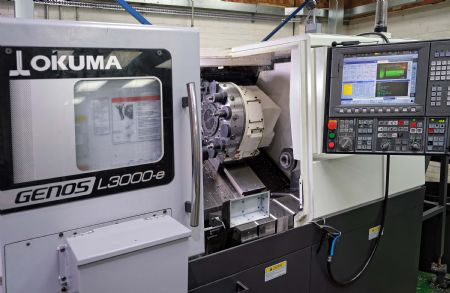 David White in front of the Okuma Multus U3000-2SW turn-mill centre at EV Engineering, High Wycombe, holding a machined titanium gyro component for an underwater ROV
David White in front of the Okuma Multus U3000-2SW turn-mill centre at EV Engineering, High Wycombe, holding a machined titanium gyro component for an underwater ROVHigh Wycombe-based sub-contracting firm EV Engineering has bought four Japanese-built Okuma mill-turn centres from sole UK agent NCMT and a pair of machining centres from another supplier, as it prepares to introduce 24hr production later this year.
Founded in 2001 by David White, the company specialises in producing complex prismatic components in exotic materials for the oil, gas and energy sector, which accounts for around three-quarters of the company’s turnover.
Mr White said: “The decline in the industry during the middle of the last decade made it difficult for us to invest in new equipment sooner. However, we have used the current short-term downturn caused by the pandemic to invest and upgrade all aspects of our High Wycombe facility.”
It was at the
EMO 2005 exhibition in Hanover, where Okuma launched its first Multus mill-turn machining centre with a B-axis spindle, that the EV Engineering production team first became interested in Okuma machines.
Advanced collision avoidanceThe five-axis Multus features advanced collision avoidance in real-time both in-cycle and in-manual mode, preventing collisions and minimising unscheduled downtime. It was the latest version of this Multus machine, with a sub-spindle and steady rest, that arrived on the shopfloor in High Wycombe in 2018.
Mr White continued: “It is an extremely rigid, slant-bed lathe on which we carry out a lot of machining including deep hole drilling in titanium and Inconel. It is not feasible to leave it to produce such high-value parts unattended, so we do not intend to add automation on this machine.
“The same goes for the Okuma Genos L3000 that we bought the same year, as it is a two-axis lathe with live tooling dedicated to producing smaller parts in lower volumes.
“It is our intention, however, to retrofit a robot to the Multus U3000-2SW multi-tasking B-axis lathe with automatic tool changer, lower turret and sub-spindle we installed in December 2019 to give us the benefit of lights-out running.”

The Okuma Space Turn LB3000-MY lathe with a live Y-axis turret, currently on order and due for delivery in May 2021, is already prepared by NCMT for automation. It will be fitted with a Belgian-manufactured RoboJob Turn-Assist, which features a flexible workpiece stacker and a six-axis robot for loading and unloading workpieces.
Apart from high build quality and good accessibility to the working area, a key reason for EV Engineering standardising on lathes from Okuma was the availability of the optional One-Touch IGF conversational programming software in addition to the G-code interface in the manufacturer’s proprietary OSP control system. In Mr White’s opinion, it is the best shopfloor programming system and control on the market.
The plan is to utilise it to allow shopfloor programming for fast turnround components that do not require the use of CAD, freeing the engineering department to concentrate on producing the more complex cycles offline.
Machining for the oil and gas industry involves processing exotic materials with a high level of accuracy and repeatability. Assisting in achieving this level of precision is the thermal stability of Okuma machines, derived from the manufacturer's ‘Thermo-Friendly Concept’ applied to both the machine structure and the spindle.

The two independent systems are based on feedback from temperature sensors to the control to deliver high-accuracy machining in a normal shopfloor environment. Tests show that thermal deviation is less than 10µm over a 24hr period, despite a wide variation in the ambient temperature in the workshop.
In addition to automating two of its turning machines, EV Engineering also intends to install an automated pallet storage and handling system to feed two five-axis machining centres, one of which has yet to arrive to replace a smaller three-axis model.
As with the lathes, extended periods of unattended operation will allow one operator to look after multiple machines, driving down manufacturing costs and maximising return on investment.
Mr White concluded: “Our plan is to be the best in the business, employ the best engineers and provide the best service. That will be underpinned by using the best machines and software on the market.”